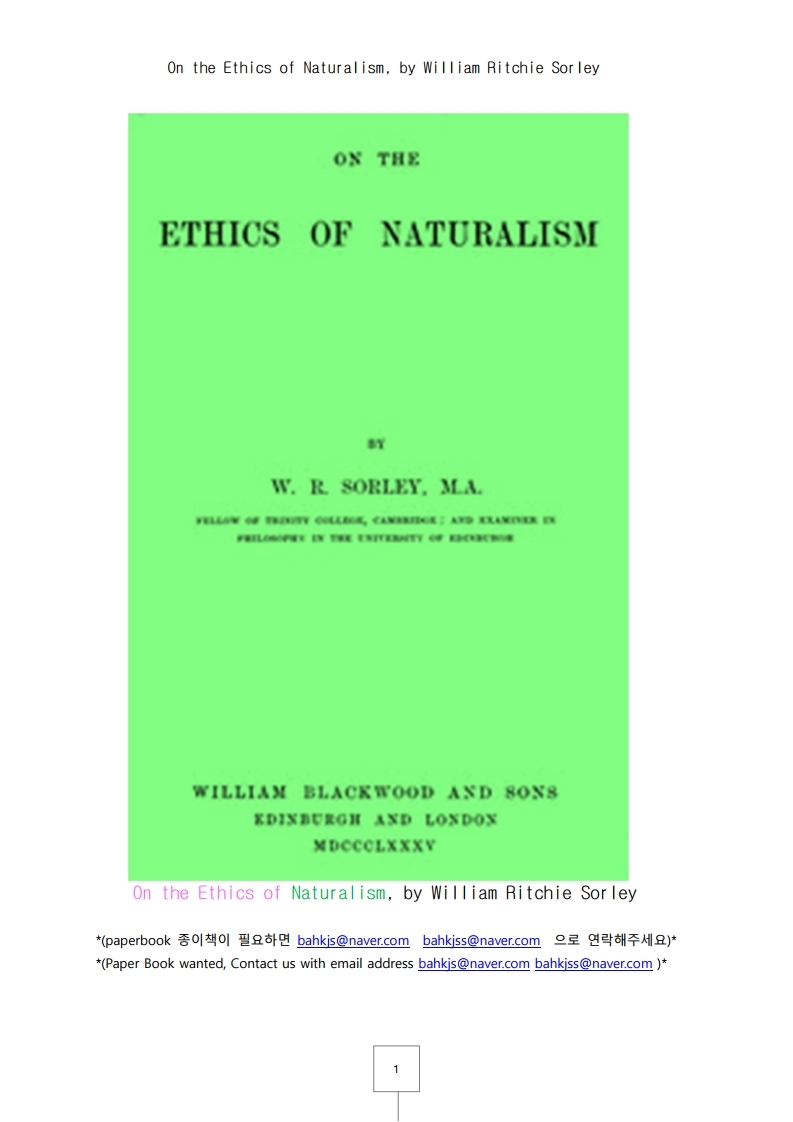9791190399852
자연주의의 윤리론.On the Ethics of Naturalism, by William Ritchie Sorley
CONTENTS.
CHAPTER I.
ETHICS AND ITS PROBLEMS.
PAGE
1. Connection of ethics with theoretical philosophy, 1
(a) Dependence of ethical on theoretical points of view, 1
(b) Ethics necessary to complete philosophy, 3
2. The inquiry into the ethical end, 5
(a) Fundamental, 5
(b) Implies a new point of view, 7
(c) Distinct from other ethical questions, 9
(α) From the inquiry into the methods of ethics, 10
(β) From moral psychology and sociology, 13
3. Scope of the present inquiry, 14
PART I.
THE INDIVIDUALISTIC THEORY.
CHAPTER II.
EGOISM.
Definition of Naturalism, 20
[ viii] Psychological hedonism, 21
1. Its theory of action ambiguous, 22
Referring to―
(a) Actual consequences of action, 23
(b) Or its expected consequences, 23
(c) Or its present characteristics, 24
2. Ethical inferences from this theory, 25
3. Transition from psychological to ethical hedonism, 31
4. Possible objections considered, 37
CHAPTER III.
THE TRANSITION TO UTILITARIANISM.
1. Difference of the standpoints of individual and State, 41
2. Connection between egoism and utilitarianism according to Bentham, 45
(a) Utilitarianism not a political duty, 46
(b) Nor a moral duty, 47
(c) Nor insisted on as a religious duty, 49
(d) Nor sufficiently motived in private ethics, 50
3. Exhaustive character of Bentham's treatment from his point of view, 51
(a) The religious sanction (Paley), 53
(b) Limits of the political sanction, 54
(c) Uncertainty of the social sanction, 55
(d) And of the internal sanction so far as a result of the social, 56
4. Mill's logical defence of utilitarianism, 57
(a) Distinction of kinds of pleasure, 58
(b) Ambiguities in his proof, 60
5. Actual transition to utilitarianism, 62
(a) Recognition of sympathy, 64
(b) The idea of equality, 69
6. The two sides of utilitarian theory without logical connection, 73
[ ix] 7. Summary of the ethical consequences of psychological hedonism, 75
CHAPTER IV.
MORAL SENTIMENT.
1. A uniform psychological theory not supplied by the opponents of
ethical hedonism, 78
2. The non- hedonistic theory of action, 84
3. Ethics made to depend on the moral sense, 89
(a) As harmony of impulses, 90
(b) As a separate sensitive faculty, 92
(c) As an internal law, 100
4. The ethics of moral sentiment a mediating theory, 105
PART II.
THE THEORY OF EVOLUTION.
CHAPTER V.
THE THEORY OF EVOLUTION AND THE DEVELOPMENT OF MORALITY.
1. General characteristics of the theory of evolution, 107
An assertion of the unity of life, 109
Primarily historical, but capable of ethical application, 110
2. The development of morality, 116
(a) Historical psychology, 116
Its difficulties, 117
Its result, 123
(b) Development of society, 124
CHAPTER VI.
EVOLUTION AND ETHICAL THEORIES.
Bearing of the theory of evolution, 126
[ x] 1. On theories depending on moral sentiment or intuition, 127
(a) Ethical value of moral sentiments affected by their origin, 130
(b) Organic character of moral sentiments, 132
Resultant attitude of evolutionism to intuitionism, 133
2. On egoism: relation of egoism to altruism, 134
(a) Social nature of the individual, 135
(b) Limits to conciliation of egoism and altruism, 141
(α) Continued existence of competition, 142
(β) Different and conflicting degrees of altruism, 143
(γ) Altruism of interest and altruism of motive, 143
(δ) Weakness of altruistic feelings, 146
(c) Tendency of evolution opposed to egoism, 148
Evolution not the basis of psychological hedonism, 148
Nor of ethical hedonism, 150
3. On utilitarianism, 152
Modification of the utilitarian method, 153
And of its principle, 155
Evolutionist objections to utilitarianism, 155
(a) As prescribing an unprogressive ideal, 156
계속.
도서소개
저자소개
목차소개





